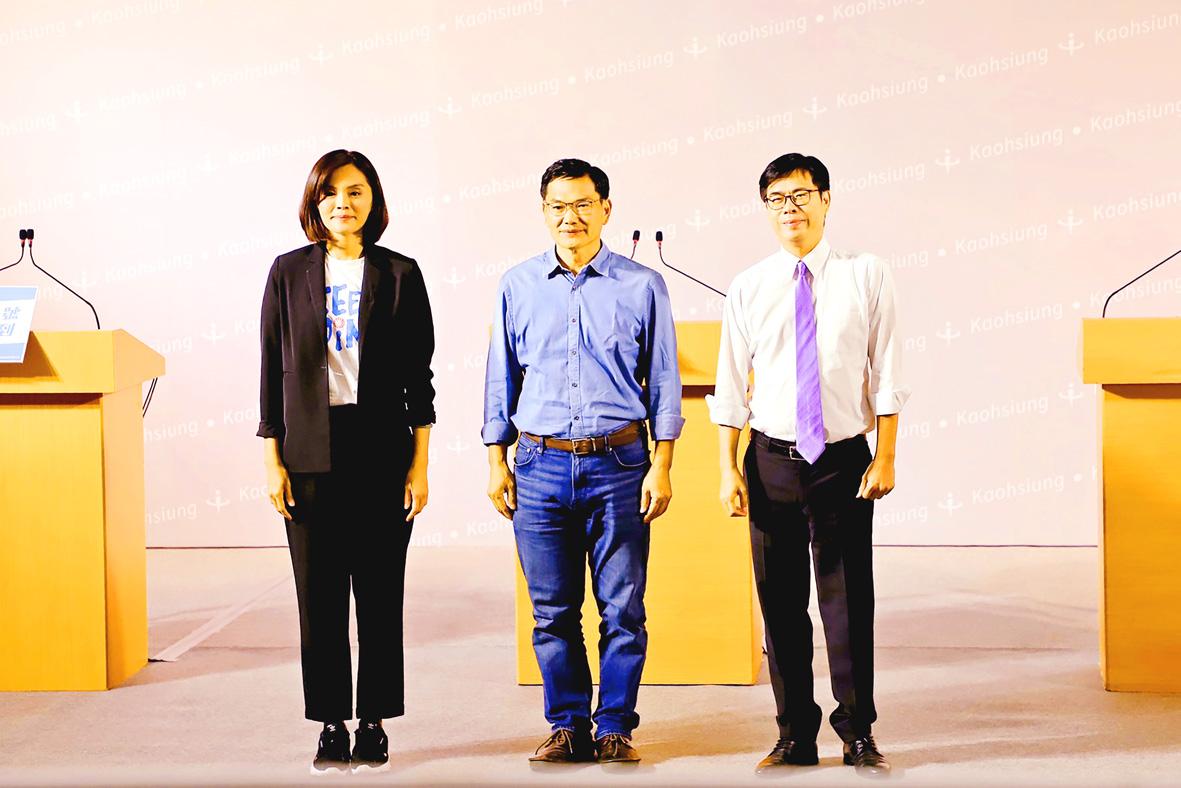All three candidates in the upcoming Kaohsiung mayoral by-election on Saturday vowed to push for infrastructure improvements, despite the city’s relatively tight budget.
During the only televised policy presentation before the vote on Sunday next week, Kaohsiung City Councilor Jane Lee (李眉蓁) of the Chinese Nationalist Party (KMT) said she would continue the efforts of former mayor Han Kuo-yu (韓國瑜) — also of the KMT and who was ousted in a recall vote in June — to make sure that “roads are flat, lights are bright and ditches are unblocked.”
She accused the Democratic Progressive Party (DPP), which governed the city for two decades before Han was elected in 2018, of failing to maintain even the most basic infrastructure.

Photo: CNA
Adding to Kaohsiung’s woes is about NT$330 billion (US$11.2 billion) in debt left by Han’s predecessors, which was partly due to poor financial management, she said.
Wu Yi-jheng (吳益政) of the Taiwan People’s Party said that the roads must be widened to make room for more trees to mitigate the effects of “urban heat islands,” areas with higher temperatures caused by dense infrastructure.
Wu also called for changes to the Act Governing the Allocation of Government Revenues and Expenditures (財政收支劃分法) so that Kaohsiung could keep more of its tax revenues.
A person can only gain intellectual freedom through financial independence, he said, adding that the concept applies to cities as well.
Lee agreed on reforming the act, and vowed to reduce the city’s debt and increase the earnings of Kaohsiung residents.
Former vice premier Chen Chi-mai (陳其邁) of the DPP, who lost to Han in 2018, denied that the central government has not taken Kaohsiung’s development seriously.
He said that the city received the most funding from the central government of any administrative area from 2017 to last year.
Chen also said the KMT had contributed to the city’s financial woes when it led Kaohsiung until 1998, adding that he would appeal to the central government for more funding.
He also pledged to establish standard operating procedures for the city’s infrastructure, including for project construction, maintenance and supervision.
Among the highlights of the presentation was Lee’s proposal to promote the city’s rum industry, because of its abundant supply of sugar cane.
If Kaohsiung could gain 10 percent of the global rum market, it could generate NT$50 billion annually, she said.
“Everybody knows Kinmen has kaoliang and Yilan has Kavalan [a whiskey distillery], and I believe Kaohsiung could establish its own market,” she said.

Alain Robert, known as the "French Spider-Man," praised Alex Honnold as exceptionally well-prepared after the US climber completed a free solo ascent of Taipei 101 yesterday. Robert said Honnold's ascent of the 508m-tall skyscraper in just more than one-and-a-half hours without using safety ropes or equipment was a remarkable achievement. "This is my life," he said in an interview conducted in French, adding that he liked the feeling of being "on the edge of danger." The 63-year-old Frenchman climbed Taipei 101 using ropes in December 2004, taking about four hours to reach the top. On a one-to-10 scale of difficulty, Robert said Taipei 101

Nipah virus infection is to be officially listed as a category 5 notifiable infectious disease in Taiwan in March, while clinical treatment guidelines are being formulated, the Centers for Disease Control (CDC) said yesterday. With Nipah infections being reported in other countries and considering its relatively high fatality rate, the centers on Jan. 16 announced that it would be listed as a notifiable infectious disease to bolster the nation’s systematic early warning system and increase public awareness, the CDC said. Bangladesh reported four fatal cases last year in separate districts, with three linked to raw date palm sap consumption, CDC Epidemic Intelligence

Two Taiwanese prosecutors were questioned by Chinese security personnel at their hotel during a trip to China’s Henan Province this month, the Mainland Affairs Council (MAC) said yesterday. The officers had personal information on the prosecutors, including “when they were assigned to their posts, their work locations and job titles,” MAC Deputy Minister and spokesman Liang Wen-chieh (梁文傑) said. On top of asking about their agencies and positions, the officers also questioned the prosecutors about the Cross-Strait Joint Crime-Fighting and Judicial Mutual Assistance Agreement, a pact that serves as the framework for Taiwan-China cooperation on combating crime and providing judicial assistance, Liang

US climber Alex Honnold left Taiwan this morning a day after completing a free-solo ascent of Taipei 101, a feat that drew cheers from onlookers and gained widespread international attention. Honnold yesterday scaled the 101-story skyscraper without a rope or safety harness. The climb — the highest urban free-solo ascent ever attempted — took just more than 90 minutes and was streamed live on Netflix. It was covered by major international news outlets including CNN, the New York Times, the Guardian and the Wall Street Journal. As Honnold prepared to leave Taiwan today, he attracted a crowd when he and his wife, Sanni,